Cast
Carmen: Patricia Bardon
Don José: Brandon Jovanovich
Micaela: Pretty Yende
Escamillo: Ildebrando d’Arcangelo
Zuniga: Valentin Anikin
Morales: Daniel Armstrong
Frasquita: Hae Ji Chang
Mercédés: Carmen Zoé Velasco
El Remendado: Keith Jameson
El Dancaire: Museop Kim
Conductor: Plácido Domingo
Production: Emlio Sagi
Director: Trevore Ross
Set Designer: Gerardo Trotti
Costume Designer: Jesús del Pozo
Lighting Designer: Guido Levi
Original Choreographer: Nuria Castejón
Associate Choreographer: Briseyda Zárate Fernández
Fight Director: Ed Douglas
Some opera lovers are always in search of the fresh, the new and the rare, but I personally never get tired of the popular warhorses. I love to see and hear the ways that different performers interpret them and make them their own. So while I’m sure that when the current LA Opera season was announced, plenty of critics yawned at the prospect of seeing Carmen again, I couldn’t have been happier or more excited to see it. And for the most part, it didn’t disappoint me. While it was far from the best performance of Carmen I’ve ever seen, it was definitely a strong one that did justice to both the charms and the dramatic power of the world’s most famous opera.
The production, which premiered in Madrid in 1999 and has been in the LA Opera repertoire since 2004 (this was its third revival and my third time seeing it), was created by Emilio Sagi, whose wild and wacky Barbiere di Siviglia has recently been sweeping the world. Unlike that Regie-ish Barbiere, his Carmen was conventional… more or less. The four sets were beautifully, atmospherically traditional in the old grand manner, but the colorful costumes, conceived by the late fashion designer Jesús del Pozo, were an avant-garde combination of 19th and early 20th century styles. The era seemed to be some unidentifiable time between Goya’s Spain and Franco’s. It was a slightly awkward concept, neither traditional nor radical. But the distinctly different color schemes of each act beautifully reflected each different emotional atmosphere: pale, sunny colors in the Act I street scene, sultry reds, purples, etc. in the shady tavern of Act II, dark, somber colors in the sinister mountains of Act III, and a blend of all of the above in the initially festive, ultimately tragic Act IV. And with a few exceptions, the costumes, like the scenery, were all lovely to look at. This was very much a pretty Carmen, not a gritty one. Any operagoer who craved the dirty, sweaty realism of, say, David McVicar’s Glyndebourne staging certainly didn’t find it in this sleek, flamenco-infused fantasy vision of Spain. But genuinely, beguilingly pretty it was, and while it wasn’t “Carmen as verismo,” it wasn’t “Carmen as mindless spectacle” either. It was a solid production, one that was big enough for the venue yet still managed to feel intimate, and that provided a very attractive, non-intrusive playground for the singers’ performances.
Unfortunately, I had mixed feelings about the one person who should captivate the audience at every moment: Carmen herself, Patricia Bardon. I had nothing against her singing, with its darkly luxurious timbre, or even her acting. Her tough sassiness and open yet never vulgar sexuality were spot on, and not only that, she believably conveyed a vulnerable side capable of real love and real fear, without it ever detracting from her strong will. But she didn’t quite exude the sultry, vivacious charisma that’s associated with the role and that Sagi’s production in particular seemed to cry out for. I couldn’t tell what type of Carmen she was trying to be: a jaded, aloof “older woman” type or a lively, joyous, youthful type. Her mature looks and deep, dark mezzo seemed best suited to the former characterization, but the staging seemed to encourage the latter, with the constant leg-flashes and flirty choreography it forced her to (stiffly) perform in Acts I and II. That said, she was much more effective in Acts III and IV, where “Carmen the seductress” gives way to “Carmen confronting death and fighting for her freedom.” I think her Carmen would be at its best in a different production, one created especially for her and specifically tailored to her talents.
I had no such misgivings about Brandon Jovanovich’s excellent Don José. While his looks and mannerisms might have been a shade too all-American, he cut a strapping figure that made it easy to believe in Carmen’s attraction to him, and his dark, baritonal tenor was capable of gripping dramatic power, of warm, melting lyricism, and of everything in between. In Act I his upper register sounded slightly congested, but by Acts II and IV it rang out with all the force that José’s rage and desperation require. Just as importantly, he was a vibrant actor, alive and immersed in the role at every moment. His journey from soldierly devotion to law and order in Act I, to lovesickness and jealousy in Act II, to deep depression that turned to fearsome rage when provoked in Act III, to a complete, spectacular psychological breakdown in Act IV, was believable and engaging every step of the way.
I suspect that plenty of people in the audience came specifically to see Ildebrando d’Arcangelo’s Escamillo, and he didn’t disappoint. His barihunk figure, natural charisma and sumptuous voice made his star status and easy to understand and earned thunderous applause with his rendition of the Toreador Song. The contrast between his dark, smoldering Latin looks and Jovanovich’s blond, blue-eyed, boy-next-door looks felt somehow very appropriate for Escamillo vs. Don José. (Handsome as he is, though, d’Arcangelo isn’t especially tall; the 6’3” Jovanovich towered over him in the duel scene, which didn’t feel right for the characters at all!) Meanwhile, the shining surprise of the performance was the lovely Micaela of LA Opera newcomer Pretty Yende. She was fully believable and thoroughly adorable, both in the sweet shyness of Act I and in the fear and desperate pleading of Act III, and sang with a luxurious lyric soprano. The audience went wild for her at the curtain call.
Valentin Anikin was a solid Zuniga, Hai Ji Chang and Carmen Zoé Velaso were appropriately charming as Frasquita and Mercédés, Museup Kim and Keith Jameson were equally decent as Dancaïre and Remendado, and the chorus not only sang well, but acted vividly, creating a real sense of individuals living their lives. The brawls in Act I, though, were a little bit tame and choreographed-looking, the children’s chorus lacked volume, and I know that some audience members were put off by the director’s more eccentric details: e.g. portraying Lillas Pastia as a hulking drag queen, and having “her” murder Zuniga with a pistol shot at the climax of Act II, giving the latter’s lines in Act IV to a random soldier instead.
Plácido Domingo (how nice to see him again, especially after his recent health crisis!) conducted with energy and an ideal grasp of emotional atmosphere, as expected from someone so familiar with the opera through the role of Don José. Guiraud’s recitatives were used, which was probably a good choice for such an international cast, except for two short scenes which used the original dialogue instead.
Was this a perfect Carmen? No. But did I enjoy it? Yes! Despite whatever flaws it had, it still captured all the qualities – charm, passion, humor, drama, sex appeal, psychological depth and great music – that give Carmen its universal appeal. I’m happy to have seen it, as were all the rest of the very enthusiastic audience. I could tell that plenty of the people around me were seeing the opera for the first time and they lapped it up. LA Opera’s 2013-14 season is off to a good, solid start!




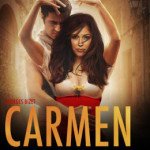
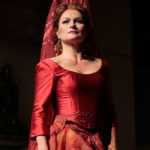
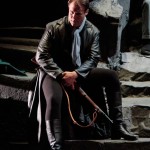
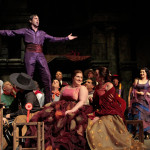
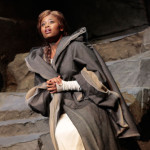
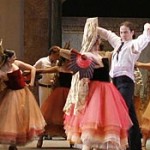
michele
October 8th, 2013 at 15:03
I enjoyed reading this review because it brought the whole performance to life as I was reading. It was a visceral enough review as opposed to a strictly intellectual one. Good. Thank you.